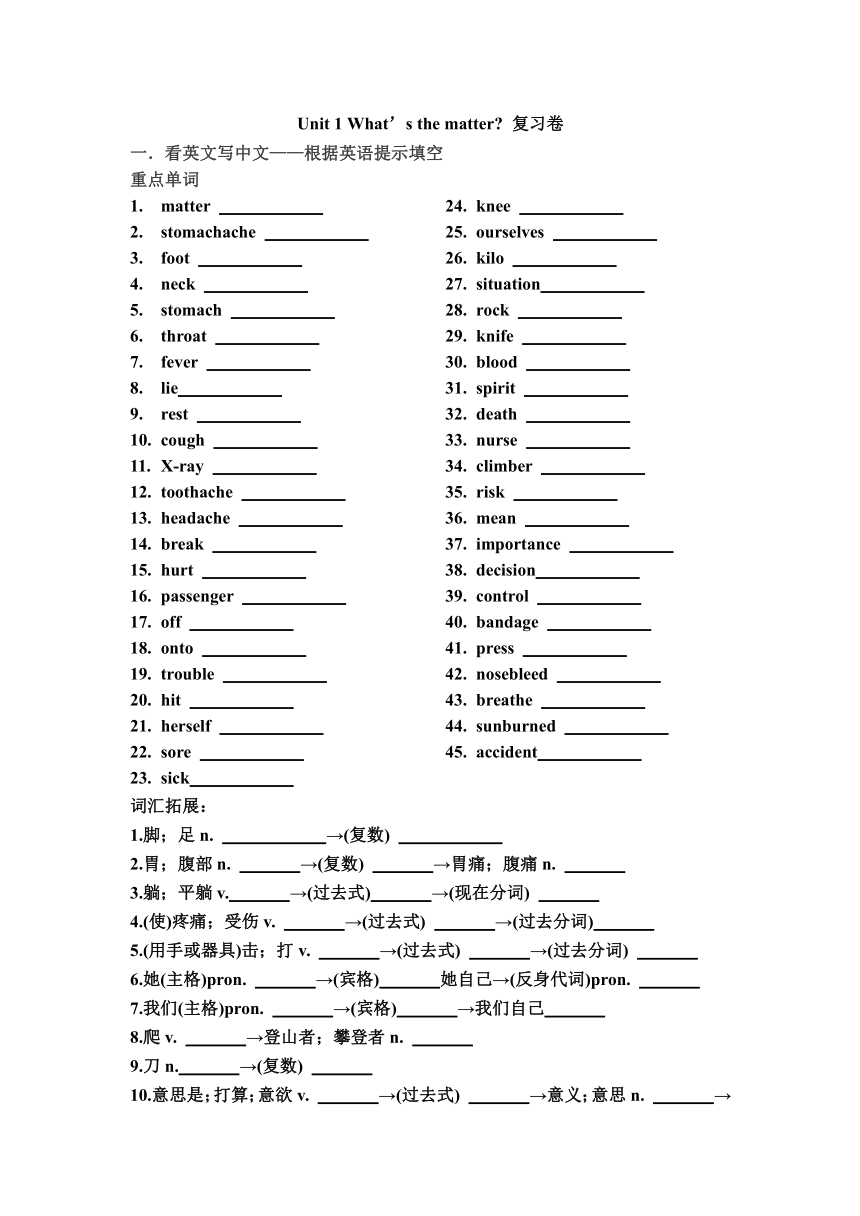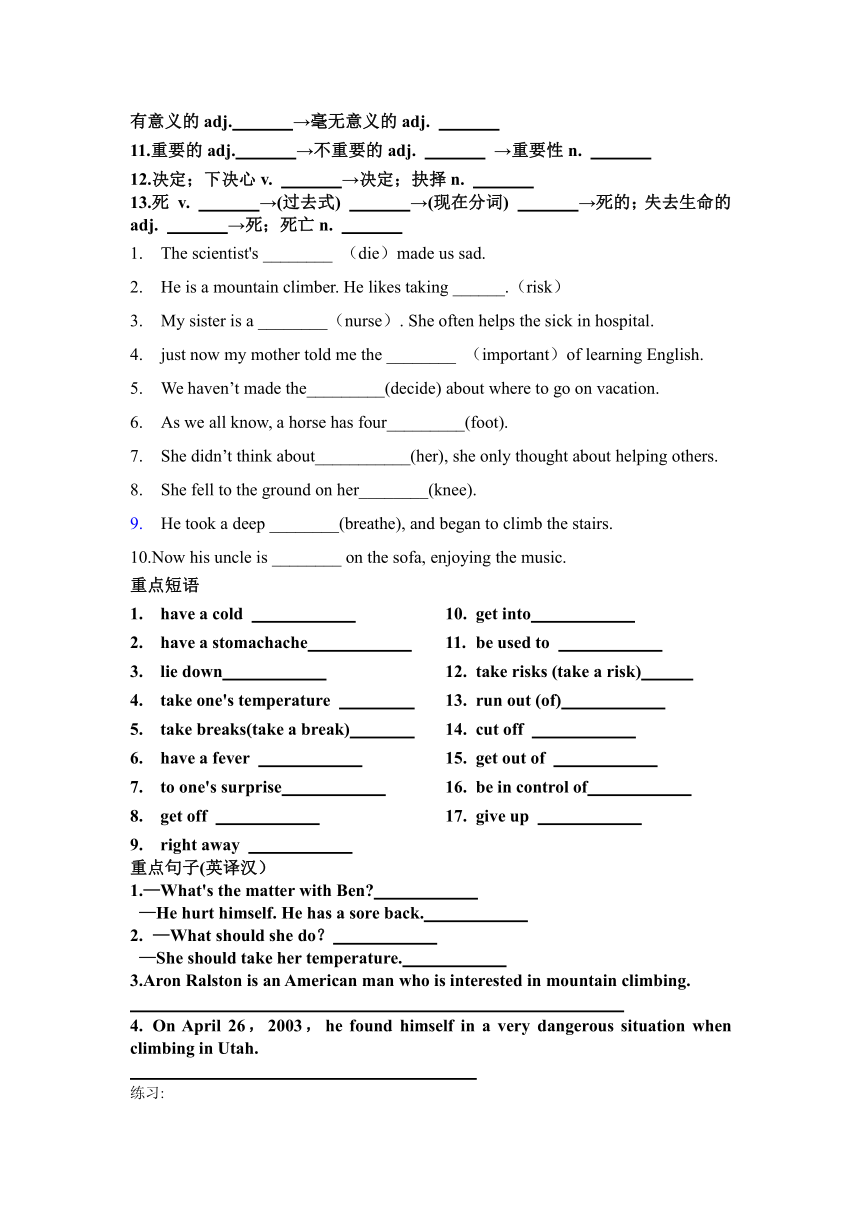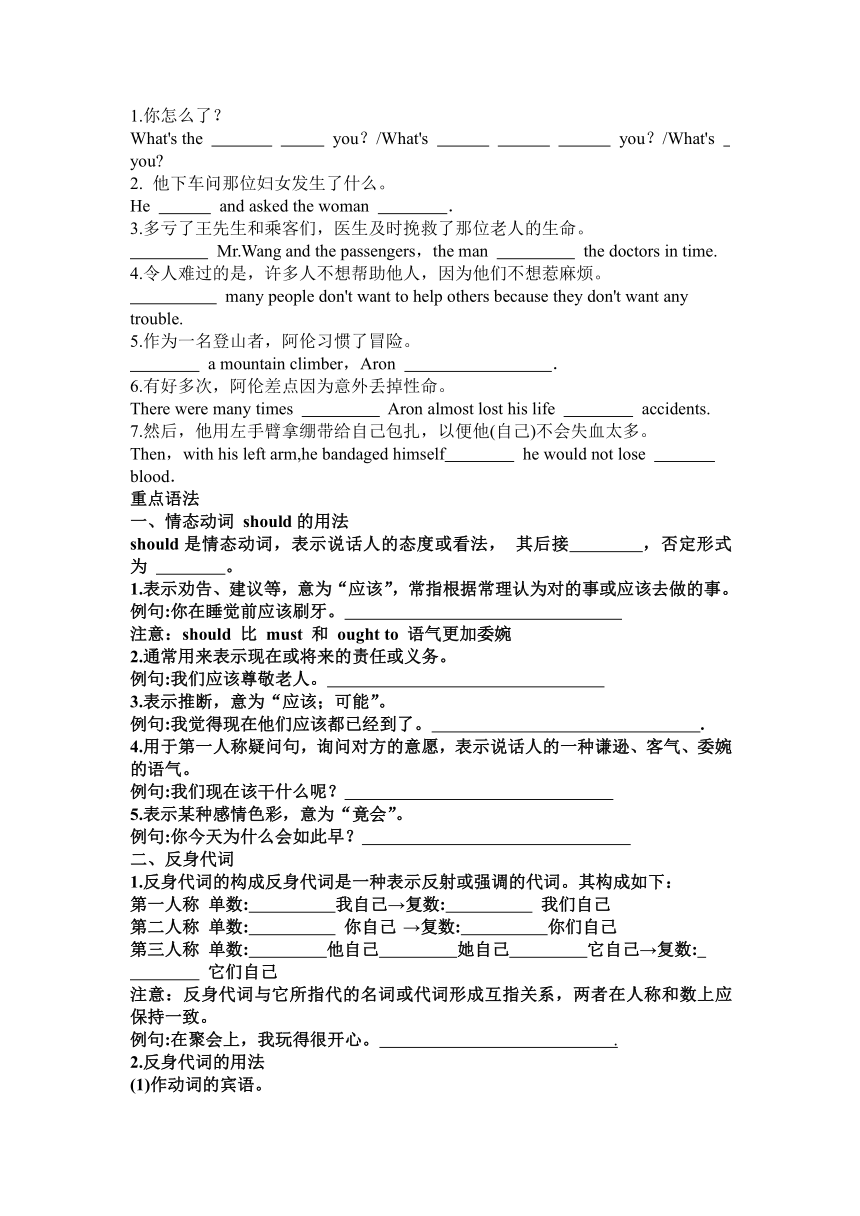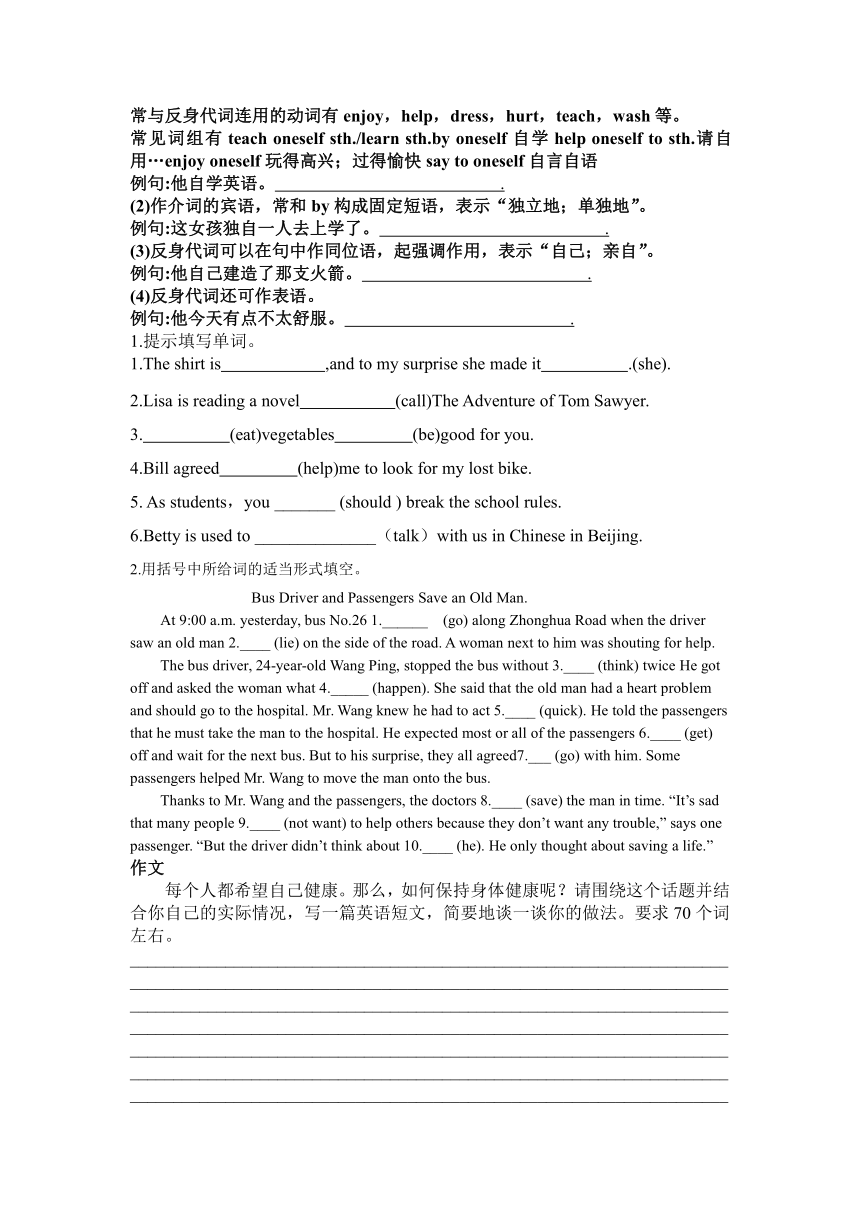Unit 1 What the matter 复习卷 (含答案)2024-2025学年人教版英语八年级下册
文档属性
| 名称 | Unit 1 What the matter 复习卷 (含答案)2024-2025学年人教版英语八年级下册 |  | |
| 格式 | docx | ||
| 文件大小 | 35.4KB | ||
| 资源类型 | 教案 | ||
| 版本资源 | 人教新目标(Go for it)版 | ||
| 科目 | 英语 | ||
| 更新时间 | 2025-02-14 13:17:17 | ||
图片预览




文档简介
Unit 1 What’s the matter 复习卷
一.看英文写中文——根据英语提示填空
重点单词
matter
stomachache
foot
neck
stomach
throat
fever
lie
rest
cough
X-ray
toothache
headache
break
hurt
passenger
off
onto
trouble
hit
herself
sore
sick
knee
ourselves
kilo
situation
rock
knife
blood
spirit
death
nurse
climber
risk
mean
importance
decision
control
bandage
press
nosebleed
breathe
sunburned
accident
词汇拓展:
1.脚;足n. →(复数)
2.胃;腹部n. →(复数) →胃痛;腹痛n.
3.躺;平躺v. →(过去式) →(现在分词)
4.(使)疼痛;受伤v. →(过去式) →(过去分词)
5.(用手或器具)击;打v. →(过去式) →(过去分词)
6.她(主格)pron. →(宾格) 她自己→(反身代词)pron.
7.我们(主格)pron. →(宾格) →我们自己
8.爬v. →登山者;攀登者n.
9.刀n. →(复数)
10.意思是;打算;意欲v. →(过去式) →意义;意思n. →有意义的adj. →毫无意义的adj.
11.重要的adj. →不重要的adj. →重要性n.
12.决定;下决心v. →决定;抉择n.
13.死 v. →(过去式) →(现在分词) →死的;失去生命的adj. →死;死亡n.
The scientist's ________ (die)made us sad.
He is a mountain climber. He likes taking ______.(risk)
My sister is a ________(nurse). She often helps the sick in hospital.
just now my mother told me the ________ (important)of learning English.
We haven’t made the_________(decide) about where to go on vacation.
As we all know, a horse has four_________(foot).
She didn’t think about___________(her), she only thought about helping others.
She fell to the ground on her________(knee).
He took a deep ________(breathe), and began to climb the stairs.
10.Now his uncle is ________ on the sofa, enjoying the music.
重点短语
have a cold
have a stomachache
lie down
take one's temperature
take breaks(take a break)
have a fever
to one's surprise
get off
right away
get into
be used to
take risks (take a risk)
run out (of)
cut off
get out of
be in control of
give up
重点句子(英译汉)
1.—What's the matter with Ben
—He hurt himself. He has a sore back.
—What should she do?
—She should take her temperature.
3.Aron Ralston is an American man who is interested in mountain climbing.
On April 26,2003,he found himself in a very dangerous situation when climbing in Utah.
练习:
1.你怎么了?
What's the you?/What's you?/What's you
他下车问那位妇女发生了什么。
He and asked the woman .
3.多亏了王先生和乘客们,医生及时挽救了那位老人的生命。
Mr.Wang and the passengers,the man the doctors in time.
4.令人难过的是,许多人不想帮助他人,因为他们不想惹麻烦。
many people don't want to help others because they don't want any trouble.
5.作为一名登山者,阿伦习惯了冒险。
a mountain climber,Aron .
6.有好多次,阿伦差点因为意外丢掉性命。
There were many times Aron almost lost his life accidents.
7.然后,他用左手臂拿绷带给自己包扎,以便他(自己)不会失血太多。
Then,with his left arm,he bandaged himself he would not lose blood.
重点语法
一、情态动词 should的用法
should是情态动词,表示说话人的态度或看法, 其后接 ,否定形式为 。
1.表示劝告、建议等,意为“应该”,常指根据常理认为对的事或应该去做的事。
例句:你在睡觉前应该刷牙。
注意:should 比 must 和 ought to 语气更加委婉
2.通常用来表示现在或将来的责任或义务。
例句:我们应该尊敬老人。
3.表示推断,意为“应该;可能”。
例句:我觉得现在他们应该都已经到了。 .
4.用于第一人称疑问句,询问对方的意愿,表示说话人的一种谦逊、客气、委婉的语气。
例句:我们现在该干什么呢?
5.表示某种感彩,意为“竟会”。
例句:你今天为什么会如此早?
二、反身代词
1.反身代词的构成反身代词是一种表示反射或强调的代词。其构成如下:
第一人称 单数: 我自己→复数: 我们自己
第二人称 单数: 你自己 →复数: 你们自己
第三人称 单数: 他自己 她自己 它自己→复数:
它们自己
注意:反身代词与它所指代的名词或代词形成互指关系,两者在人称和数上应保持一致。
例句:在聚会上,我玩得很开心。 .
2.反身代词的用法
(1)作动词的宾语。
常与反身代词连用的动词有enjoy,help,dress,hurt,teach,wash等。
常见词组有teach oneself sth./learn sth.by oneself自学help oneself to sth.请自用…enjoy oneself玩得高兴;过得愉快say to oneself自言自语
例句:他自学英语。 .
(2)作介词的宾语,常和by构成固定短语,表示“独立地;单独地”。
例句:这女孩独自一人去上学了。 .
(3)反身代词可以在句中作同位语,起强调作用,表示“自己;亲自”。
例句:他自己建造了那支火箭。 .
(4)反身代词还可作表语。
例句:他今天有点不太舒服。 .
1.提示填写单词。
1.The shirt is ,and to my surprise she made it .(she).
2.Lisa is reading a novel (call)The Adventure of Tom Sawyer.
3. (eat)vegetables (be)good for you.
4.Bill agreed (help)me to look for my lost bike.
5. As students,you _______ (should ) break the school rules.
6.Betty is used to ______________(talk)with us in Chinese in Beijing.
2.用括号中所给词的适当形式填空。
Bus Driver and Passengers Save an Old Man.
At 9:00 a.m. yesterday, bus No.26 1.______ (go) along Zhonghua Road when the driver saw an old man 2.____ (lie) on the side of the road. A woman next to him was shouting for help.
The bus driver, 24-year-old Wang Ping, stopped the bus without 3.____ (think) twice He got off and asked the woman what 4._____ (happen). She said that the old man had a heart problem and should go to the hospital. Mr. Wang knew he had to act 5.____ (quick). He told the passengers that he must take the man to the hospital. He expected most or all of the passengers 6.____ (get) off and wait for the next bus. But to his surprise, they all agreed7.___ (go) with him. Some passengers helped Mr. Wang to move the man onto the bus.
Thanks to Mr. Wang and the passengers, the doctors 8.____ (save) the man in time. “It’s sad that many people 9.____ (not want) to help others because they don’t want any trouble,” says one passenger. “But the driver didn’t think about 10.____ (he). He only thought about saving a life.”
作文
每个人都希望自己健康。那么,如何保持身体健康呢?请围绕这个话题并结合你自己的实际情况,写一篇英语短文,简要地谈一谈你的做法。要求70个词左右。
____________________________________________________________________________________________________________________________________________________________________________________________________________________________________________________________________________________
_______________________________________________________________________________________________________________________________________________________________________________________________________________
答案
Unit 1 What’s the matter 复习卷
一.看英文写中文——根据英语提示填空
重点单词
matter n.问题;事情
stomachache n.胃痛;腹痛
foot n.脚;足
neck n.颈;脖子
stomach n.胃;腹部
throat n.咽喉;喉咙
fever n.发烧
lie v.躺;平躺
rest v.& n.放松;休息
cough v.& n.咳嗽
X-ray n.X射线;X光
toothache n.牙痛
headache n.头痛
break n.间歇;休息
hurt v.(使)疼痛;受伤
passenger n.乘客;旅客
off adv.& prep.离开(某处);不工作;从……去掉
onto prep.向;朝
trouble n.问题;苦恼
hit v.(用手或器具)击;打
herself pron.她自己
sore adj.疼痛的;酸痛的
sick adj.生病的;有病的
knee n.膝;膝盖
ourselves pron.我们自己
kilo n.千克;公斤
situation n.情况;状况
rock n.岩石
knife n.刀
blood n.血
spirit n.勇气;意志
death n.死;死亡
nurse n.护士
climber n.登山者;攀登者
risk n.& v.危险;风险;冒险
mean v.意思是;打算;意欲
importance n.重要性;重要
decision n.决定;抉择
control n.& v.限制;约束;管理
bandage n.绷带v.用绷带包扎
press v.压;挤;按
nosebleed n.鼻出血
breathe v.呼吸
sunburned adj.晒伤的
accident n.(交通)事故;意外遭遇
词汇拓展:
1.脚;足n. foot→(复数) feet
2.胃;腹部n. stomach(复数) →stomachs→胃痛;腹痛n. stomachache
3.躺;平躺v. lie→(过去式) lay→(现在分词) lying
4.(使)疼痛;受伤v. hurt→(过去式) hurt→(过去分词) hurt
5.(用手或器具)击;打v. hit→(过去式) hit→(过去分词) hit
6.她(主格)pron. she→(宾格)her她自己→(反身代词)pron. herself
7.我们(主格)pron. we→(宾格)us→我们自己(反身代词)pron. ourselves
8.爬v. climb→登山者;攀登者n. climber
9.刀n. knife→(复数) knives
10.意思是;打算;意欲v. mean→(过去式) meant→意义;意思n. meaning →有意义的adj. meaningful→毫无意义的adj. meaningless
11.重要的adj. important →不重要的adj. unimportant →重要性n. importance
12.决定;下决心v. decide→决定;抉择n. decision
13.死 v. die→(过去式) died→(现在分词) dying→死的;失去生命的adj. dead→死;死亡n. death
练习:
death risks nurse importance decision feet herself knees breath lying
重点短语
have a cold 感冒
have a stomachache 胃痛
lie down 躺下
take one's temperature 量体温
take breaks(take a break)休息
have a fever 发烧
to one's surprise 使……惊讶的
get off 下车
right away 立即;马上
get into 陷入;参与
be used to 习惯于……;适应于……
take risks (take a risk)冒险
run out (of)用尽;耗尽
cut off 切除
get out of 离开;从……出来
be in control of 掌管;管理
give up 放
重点句子
1.—What's the matter with Ben 本怎么了?
—He hurt himself. He has a sore back.他伤到了他自己,他背痛。
2.—What should she do?她该怎么办?
—She should take her temperature.她应该量下体温。
3.Aron Ralston is an American man who is interested in mountain climbing.
阿伦·罗尔斯顿是一位对登山感兴趣的美国人。
On April 26,2003,he found himself in a very dangerous situation when climbing in Utah.在2003年4月26日,当他在犹他州爬山时,他发现自己处于一个非常危险的境况之中。
1.你怎么了?
What's the matter with you?/What's the trouble with you?/What's wrong with you
他下车问那位妇女发生了什么。
He got off and asked the woman what happened.
3.多亏了王先生和乘客们,医生及时挽救了那位老人的生命。
Thanks to Mr.Wang and the passengers,the man was saved by the doctors in time.
4.令人难过的是,许多人不想帮助他人,因为他们不想惹麻烦。
It's sad that many people don't want to help others because they don't want any trouble.
5.作为一名登山者,阿伦习惯了冒险。
As a mountain climber,Aron is used to taking risks.
6.有好多次,阿伦差点因为意外丢掉性命。
There were many times when Aron almost lost his life because of accidents.
7.然后,他用左手臂拿绷带给自己包扎,以便他(自己)不会失血太多。
Then,with his left arm,he bandaged himself so that he would not lose too much blood.
重点语法
一、情态动词 should的用法
should是情态动词,表示说话人的态度或看法, 其后接动词原形,否定形式为 shouldn’t。
1.表示劝告、建议等,意为“应该”,常指根据常理认为对的事或应该去做的事。
例句:你在睡觉前应该刷牙。You should brush your teeth before you go to bed。
注意:should 比 must 和 ought to 语气更加委婉
2.通常用来表示现在或将来的责任或义务。
例句:我们应该尊敬老人。We should respect the old.
3.表示推断,意为“应该;可能”。
例句:我觉得现在他们应该都已经到了。They should be there by now,I think.
4.用于第一人称疑问句,询问对方的意愿,表示说话人的一种谦逊、客气、委婉的语气。
例句:我们现在该干什么呢?What should we do now
5.表示某种感彩,意为“竟会”,常用于以how, why开头引导的特殊疑问句中。
例句:你今天为什么会如此早?Why should you be so early today
二、反身代词
1.反身代词的构成反身代词是一种表示反射或强调的代词。
其构成如下表:
第一人称 单数:myself 我自己→复数:ourselves 我们自己
第二人称 单数:yourself 你自己 →复数:yourselves 你们自己
第三人称 单数:himself他自己herself她自己itself它自己→复数:themselves 它们自己
注意:反身代词与它所指代的名词或代词形成互指关系,两者在人称和数上应保持一致。
例句:在聚会上,我玩得很开心。I enjoyed myself at the party.
2.反身代词的用法
(1)作动词的宾语。
常与反身代词连用的动词有enjoy,help,dress,hurt,teach,wash等。
常见词组有teach oneself sth./learn sth.by oneself自学
help oneself to sth.请自用……(随便吃/喝些……)
enjoy oneself玩得高兴;过得愉快
say to oneself自言自语
例句:他自学英语。He teaches himself English.
(2)作介词的宾语,常和by构成固定短语,表示“独立地;单独地”。
例句:The girl went to school by herself.这女孩独自一人去上学了。
(3)反身代词可以在句中作同位语,起强调作用,表示“自己;亲自”。
例句:他自己建造了那支火箭。He himself built the rocket.
(4)反身代词还可作表语。
例句:他今天有点不太舒服。He is not himself today.
提示填写单词。
hers; herself 2.called 3.Eating; is 4.to help 5.shouldn’t 6.taking
用括号中所给词的适当形式填空。
1.was going 2. lying 3. thinking 4. happened 5.quickly
6.to get 7.to go 8.saved 9. don’t want 10.himself
作文
One possible version:
It’s important for everyone to keep healthy. As for myself, how do I keep healthy First, I take exercise every day. I like many kinds of sports such as running, swimming, playing basketball, etc. Second, I eat a balanced diet. I have a good eating habit. I like vegetables and fruit very much, and I seldom eat junk food. Third, I sleep for at least eight hours every night. I think the best way of relaxing is sleeping.
一.看英文写中文——根据英语提示填空
重点单词
matter
stomachache
foot
neck
stomach
throat
fever
lie
rest
cough
X-ray
toothache
headache
break
hurt
passenger
off
onto
trouble
hit
herself
sore
sick
knee
ourselves
kilo
situation
rock
knife
blood
spirit
death
nurse
climber
risk
mean
importance
decision
control
bandage
press
nosebleed
breathe
sunburned
accident
词汇拓展:
1.脚;足n. →(复数)
2.胃;腹部n. →(复数) →胃痛;腹痛n.
3.躺;平躺v. →(过去式) →(现在分词)
4.(使)疼痛;受伤v. →(过去式) →(过去分词)
5.(用手或器具)击;打v. →(过去式) →(过去分词)
6.她(主格)pron. →(宾格) 她自己→(反身代词)pron.
7.我们(主格)pron. →(宾格) →我们自己
8.爬v. →登山者;攀登者n.
9.刀n. →(复数)
10.意思是;打算;意欲v. →(过去式) →意义;意思n. →有意义的adj. →毫无意义的adj.
11.重要的adj. →不重要的adj. →重要性n.
12.决定;下决心v. →决定;抉择n.
13.死 v. →(过去式) →(现在分词) →死的;失去生命的adj. →死;死亡n.
The scientist's ________ (die)made us sad.
He is a mountain climber. He likes taking ______.(risk)
My sister is a ________(nurse). She often helps the sick in hospital.
just now my mother told me the ________ (important)of learning English.
We haven’t made the_________(decide) about where to go on vacation.
As we all know, a horse has four_________(foot).
She didn’t think about___________(her), she only thought about helping others.
She fell to the ground on her________(knee).
He took a deep ________(breathe), and began to climb the stairs.
10.Now his uncle is ________ on the sofa, enjoying the music.
重点短语
have a cold
have a stomachache
lie down
take one's temperature
take breaks(take a break)
have a fever
to one's surprise
get off
right away
get into
be used to
take risks (take a risk)
run out (of)
cut off
get out of
be in control of
give up
重点句子(英译汉)
1.—What's the matter with Ben
—He hurt himself. He has a sore back.
—What should she do?
—She should take her temperature.
3.Aron Ralston is an American man who is interested in mountain climbing.
On April 26,2003,he found himself in a very dangerous situation when climbing in Utah.
练习:
1.你怎么了?
What's the you?/What's you?/What's you
他下车问那位妇女发生了什么。
He and asked the woman .
3.多亏了王先生和乘客们,医生及时挽救了那位老人的生命。
Mr.Wang and the passengers,the man the doctors in time.
4.令人难过的是,许多人不想帮助他人,因为他们不想惹麻烦。
many people don't want to help others because they don't want any trouble.
5.作为一名登山者,阿伦习惯了冒险。
a mountain climber,Aron .
6.有好多次,阿伦差点因为意外丢掉性命。
There were many times Aron almost lost his life accidents.
7.然后,他用左手臂拿绷带给自己包扎,以便他(自己)不会失血太多。
Then,with his left arm,he bandaged himself he would not lose blood.
重点语法
一、情态动词 should的用法
should是情态动词,表示说话人的态度或看法, 其后接 ,否定形式为 。
1.表示劝告、建议等,意为“应该”,常指根据常理认为对的事或应该去做的事。
例句:你在睡觉前应该刷牙。
注意:should 比 must 和 ought to 语气更加委婉
2.通常用来表示现在或将来的责任或义务。
例句:我们应该尊敬老人。
3.表示推断,意为“应该;可能”。
例句:我觉得现在他们应该都已经到了。 .
4.用于第一人称疑问句,询问对方的意愿,表示说话人的一种谦逊、客气、委婉的语气。
例句:我们现在该干什么呢?
5.表示某种感彩,意为“竟会”。
例句:你今天为什么会如此早?
二、反身代词
1.反身代词的构成反身代词是一种表示反射或强调的代词。其构成如下:
第一人称 单数: 我自己→复数: 我们自己
第二人称 单数: 你自己 →复数: 你们自己
第三人称 单数: 他自己 她自己 它自己→复数:
它们自己
注意:反身代词与它所指代的名词或代词形成互指关系,两者在人称和数上应保持一致。
例句:在聚会上,我玩得很开心。 .
2.反身代词的用法
(1)作动词的宾语。
常与反身代词连用的动词有enjoy,help,dress,hurt,teach,wash等。
常见词组有teach oneself sth./learn sth.by oneself自学help oneself to sth.请自用…enjoy oneself玩得高兴;过得愉快say to oneself自言自语
例句:他自学英语。 .
(2)作介词的宾语,常和by构成固定短语,表示“独立地;单独地”。
例句:这女孩独自一人去上学了。 .
(3)反身代词可以在句中作同位语,起强调作用,表示“自己;亲自”。
例句:他自己建造了那支火箭。 .
(4)反身代词还可作表语。
例句:他今天有点不太舒服。 .
1.提示填写单词。
1.The shirt is ,and to my surprise she made it .(she).
2.Lisa is reading a novel (call)The Adventure of Tom Sawyer.
3. (eat)vegetables (be)good for you.
4.Bill agreed (help)me to look for my lost bike.
5. As students,you _______ (should ) break the school rules.
6.Betty is used to ______________(talk)with us in Chinese in Beijing.
2.用括号中所给词的适当形式填空。
Bus Driver and Passengers Save an Old Man.
At 9:00 a.m. yesterday, bus No.26 1.______ (go) along Zhonghua Road when the driver saw an old man 2.____ (lie) on the side of the road. A woman next to him was shouting for help.
The bus driver, 24-year-old Wang Ping, stopped the bus without 3.____ (think) twice He got off and asked the woman what 4._____ (happen). She said that the old man had a heart problem and should go to the hospital. Mr. Wang knew he had to act 5.____ (quick). He told the passengers that he must take the man to the hospital. He expected most or all of the passengers 6.____ (get) off and wait for the next bus. But to his surprise, they all agreed7.___ (go) with him. Some passengers helped Mr. Wang to move the man onto the bus.
Thanks to Mr. Wang and the passengers, the doctors 8.____ (save) the man in time. “It’s sad that many people 9.____ (not want) to help others because they don’t want any trouble,” says one passenger. “But the driver didn’t think about 10.____ (he). He only thought about saving a life.”
作文
每个人都希望自己健康。那么,如何保持身体健康呢?请围绕这个话题并结合你自己的实际情况,写一篇英语短文,简要地谈一谈你的做法。要求70个词左右。
____________________________________________________________________________________________________________________________________________________________________________________________________________________________________________________________________________________
_______________________________________________________________________________________________________________________________________________________________________________________________________________
答案
Unit 1 What’s the matter 复习卷
一.看英文写中文——根据英语提示填空
重点单词
matter n.问题;事情
stomachache n.胃痛;腹痛
foot n.脚;足
neck n.颈;脖子
stomach n.胃;腹部
throat n.咽喉;喉咙
fever n.发烧
lie v.躺;平躺
rest v.& n.放松;休息
cough v.& n.咳嗽
X-ray n.X射线;X光
toothache n.牙痛
headache n.头痛
break n.间歇;休息
hurt v.(使)疼痛;受伤
passenger n.乘客;旅客
off adv.& prep.离开(某处);不工作;从……去掉
onto prep.向;朝
trouble n.问题;苦恼
hit v.(用手或器具)击;打
herself pron.她自己
sore adj.疼痛的;酸痛的
sick adj.生病的;有病的
knee n.膝;膝盖
ourselves pron.我们自己
kilo n.千克;公斤
situation n.情况;状况
rock n.岩石
knife n.刀
blood n.血
spirit n.勇气;意志
death n.死;死亡
nurse n.护士
climber n.登山者;攀登者
risk n.& v.危险;风险;冒险
mean v.意思是;打算;意欲
importance n.重要性;重要
decision n.决定;抉择
control n.& v.限制;约束;管理
bandage n.绷带v.用绷带包扎
press v.压;挤;按
nosebleed n.鼻出血
breathe v.呼吸
sunburned adj.晒伤的
accident n.(交通)事故;意外遭遇
词汇拓展:
1.脚;足n. foot→(复数) feet
2.胃;腹部n. stomach(复数) →stomachs→胃痛;腹痛n. stomachache
3.躺;平躺v. lie→(过去式) lay→(现在分词) lying
4.(使)疼痛;受伤v. hurt→(过去式) hurt→(过去分词) hurt
5.(用手或器具)击;打v. hit→(过去式) hit→(过去分词) hit
6.她(主格)pron. she→(宾格)her她自己→(反身代词)pron. herself
7.我们(主格)pron. we→(宾格)us→我们自己(反身代词)pron. ourselves
8.爬v. climb→登山者;攀登者n. climber
9.刀n. knife→(复数) knives
10.意思是;打算;意欲v. mean→(过去式) meant→意义;意思n. meaning →有意义的adj. meaningful→毫无意义的adj. meaningless
11.重要的adj. important →不重要的adj. unimportant →重要性n. importance
12.决定;下决心v. decide→决定;抉择n. decision
13.死 v. die→(过去式) died→(现在分词) dying→死的;失去生命的adj. dead→死;死亡n. death
练习:
death risks nurse importance decision feet herself knees breath lying
重点短语
have a cold 感冒
have a stomachache 胃痛
lie down 躺下
take one's temperature 量体温
take breaks(take a break)休息
have a fever 发烧
to one's surprise 使……惊讶的
get off 下车
right away 立即;马上
get into 陷入;参与
be used to 习惯于……;适应于……
take risks (take a risk)冒险
run out (of)用尽;耗尽
cut off 切除
get out of 离开;从……出来
be in control of 掌管;管理
give up 放
重点句子
1.—What's the matter with Ben 本怎么了?
—He hurt himself. He has a sore back.他伤到了他自己,他背痛。
2.—What should she do?她该怎么办?
—She should take her temperature.她应该量下体温。
3.Aron Ralston is an American man who is interested in mountain climbing.
阿伦·罗尔斯顿是一位对登山感兴趣的美国人。
On April 26,2003,he found himself in a very dangerous situation when climbing in Utah.在2003年4月26日,当他在犹他州爬山时,他发现自己处于一个非常危险的境况之中。
1.你怎么了?
What's the matter with you?/What's the trouble with you?/What's wrong with you
他下车问那位妇女发生了什么。
He got off and asked the woman what happened.
3.多亏了王先生和乘客们,医生及时挽救了那位老人的生命。
Thanks to Mr.Wang and the passengers,the man was saved by the doctors in time.
4.令人难过的是,许多人不想帮助他人,因为他们不想惹麻烦。
It's sad that many people don't want to help others because they don't want any trouble.
5.作为一名登山者,阿伦习惯了冒险。
As a mountain climber,Aron is used to taking risks.
6.有好多次,阿伦差点因为意外丢掉性命。
There were many times when Aron almost lost his life because of accidents.
7.然后,他用左手臂拿绷带给自己包扎,以便他(自己)不会失血太多。
Then,with his left arm,he bandaged himself so that he would not lose too much blood.
重点语法
一、情态动词 should的用法
should是情态动词,表示说话人的态度或看法, 其后接动词原形,否定形式为 shouldn’t。
1.表示劝告、建议等,意为“应该”,常指根据常理认为对的事或应该去做的事。
例句:你在睡觉前应该刷牙。You should brush your teeth before you go to bed。
注意:should 比 must 和 ought to 语气更加委婉
2.通常用来表示现在或将来的责任或义务。
例句:我们应该尊敬老人。We should respect the old.
3.表示推断,意为“应该;可能”。
例句:我觉得现在他们应该都已经到了。They should be there by now,I think.
4.用于第一人称疑问句,询问对方的意愿,表示说话人的一种谦逊、客气、委婉的语气。
例句:我们现在该干什么呢?What should we do now
5.表示某种感彩,意为“竟会”,常用于以how, why开头引导的特殊疑问句中。
例句:你今天为什么会如此早?Why should you be so early today
二、反身代词
1.反身代词的构成反身代词是一种表示反射或强调的代词。
其构成如下表:
第一人称 单数:myself 我自己→复数:ourselves 我们自己
第二人称 单数:yourself 你自己 →复数:yourselves 你们自己
第三人称 单数:himself他自己herself她自己itself它自己→复数:themselves 它们自己
注意:反身代词与它所指代的名词或代词形成互指关系,两者在人称和数上应保持一致。
例句:在聚会上,我玩得很开心。I enjoyed myself at the party.
2.反身代词的用法
(1)作动词的宾语。
常与反身代词连用的动词有enjoy,help,dress,hurt,teach,wash等。
常见词组有teach oneself sth./learn sth.by oneself自学
help oneself to sth.请自用……(随便吃/喝些……)
enjoy oneself玩得高兴;过得愉快
say to oneself自言自语
例句:他自学英语。He teaches himself English.
(2)作介词的宾语,常和by构成固定短语,表示“独立地;单独地”。
例句:The girl went to school by herself.这女孩独自一人去上学了。
(3)反身代词可以在句中作同位语,起强调作用,表示“自己;亲自”。
例句:他自己建造了那支火箭。He himself built the rocket.
(4)反身代词还可作表语。
例句:他今天有点不太舒服。He is not himself today.
提示填写单词。
hers; herself 2.called 3.Eating; is 4.to help 5.shouldn’t 6.taking
用括号中所给词的适当形式填空。
1.was going 2. lying 3. thinking 4. happened 5.quickly
6.to get 7.to go 8.saved 9. don’t want 10.himself
作文
One possible version:
It’s important for everyone to keep healthy. As for myself, how do I keep healthy First, I take exercise every day. I like many kinds of sports such as running, swimming, playing basketball, etc. Second, I eat a balanced diet. I have a good eating habit. I like vegetables and fruit very much, and I seldom eat junk food. Third, I sleep for at least eight hours every night. I think the best way of relaxing is sleeping.
同课章节目录
- Unit 1 What's the matter?
- Section A
- Section B
- Unit 2 I'll help to clean up the city parks.
- Section A
- Section B
- Unit 3 Could you please clean your room?
- Section A
- Section B
- Unit 4 Why don't you talk to your parents?
- Section A
- Section B
- Unit 5 What were you doing when the rainstorm came
- Section A
- Section B
- Review of Units 1-5
- Unit 6 An old man tried to move the mountains.
- Section A
- Section B
- Unit 7 What's the highest mountain in the world?
- Section A
- Section B
- Unit 8 Have you read Treasure Island yet?
- Section A
- Section B
- Unit 9 Have you ever been to a museum?
- Section A
- Section B
- Unit 10 I've had this bike for three years.
- Section A
- Section B
